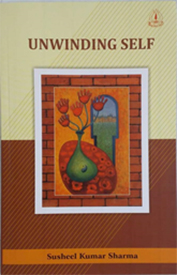Patricia Prime
Patricia Prime

Unwinding Self | Collection of Poems | Susheel Kumar Sharma |
Vishvanatha Kaviraja Institute, Cuttack (India) 2020 |
ISBN 978-81-943450-3-9 | PB | pp 152 |  250 / US $15 / € 20
250 / US $15 / € 20
A blend of subjective and objective scenarios
Susheel Kumar Sharma’s new volume of poems Unwinding Self contains a variety of poems and other writing. These include Snapshots: short 4 or 5-line poems, lengthier poems, “Stories from the Mahabharata” (3-line poems), and a formidable Glossary. Besides, several essays by colleagues are featured in “Afterwords.” These include “A Cross-Cultural Journey of Self-Discovery” by Asun Lopez-Varela; “Interrogating the Allusive Moments” by Donovan Roebert; “A Mixture of Flavours” by Jeno Francis Kidasi; “Poems of Subtlety and Arresting Imagery” by Patricia Prime; “A Constellation of Forms, Feelings & Ideas” by Patrycja Austin; “Unlocking the Heart and Going Beyond” by Pradip Kumar Patra; and “Love of Values” by Svitlana Buchatska.
Susheel Kumar Sharma is one of the most original poets currently writing in English. His voice, unlike many voices, sustains fidelity to itself. The poems are animated. First they succeed as euphony, then as revelation, then as liturgy. Unwinding Self is a memorable addition to what is an already highly distinguished oeuvre. All the poet’s talents prevail in abundance: the packed form, the syntax, the tact in the face of difficult subject matter.
Unwinding Self brings past and present alongside each other in a sustained and intimate way. The first group of short, numbered poems – “Snapshots” – begins with the following poem, which indicates the poet’s feelings about his own talents and the enchantment of, perhaps, a child or a lover –
My voice
Empty noise.
Your babble
Enchanting music.
We are God’s creation. (1)
In these short poems, the poet compares his voice to that of another voice. Love, loss, music, beauty are a familiar cluster for poetry. The slightly formal language and the elegiac mode continues with a series of poems about diverse subjects such as animals, a tsunami, the sun, a wife, children and the final short poem about the gods –
I am Uma.
I am Vishnu.
I am Varanasi.
Where is Bhagiratha? (3)
The poet often works in form, and pays homage to the ancient bond between lyric verse and song. The lengthy poem, “On Reading Langston Hughes Theme for English B”, spans five pages and invokes the poet’s teaching experiences and his relationship with a student. The poem begins:
I remember it distinctly
That I was passing on
Instructions after instructions
And wanted him to
Take them down each one of them
In his notebook
So that in the moments of crisis
When he was losing hope
And when our relations
Were tense and turned sour
They were the reference points
To begin a new relationship
Or save the old one
From getting snapped. (7)
Near the beginning of the book is the poem, “Thus Spake a Woman,” a poem divided into four sections: i. A Dreamer, ii. Fracas, iii. The Cracked World, and iv. A Lament. The poem begins with these lovely lines:
A thousand suns lit up my life
When the strings of a violin stirred my heart
To the tune of the harmonium in my mind
While I stood before the mirror. (16)
The poems move gracefully among poems about the New Year, the long paeans about “The World in Words in 2015,” which is divided into eight sections. Another lengthy sequence is “Bubli Poems,” which is divided into eleven sections. The poem focuses on a woman named Bubli, her life in the village and her search for a leader. The poem opens with these lines:
Her name is Bubli.
Though she does not know
What she is bubbling with
Yet the village lad knows.
He runs after her
He asks for a favour
Asks her to sit under the tree,
Away from the crowd
And sing him a song. (37)
The more personal poems are well-crafted; the themes often about love, life and mortality; the structures simple but musical. I found the poems about the poet’s father most moving. Here, for example, are the opening lines of “Like Father, Unlike Son,” which are especially intriguing:
His father had carried a leather attaché case
When he came to the city.
Her father has been transported to Guyana
Without any baggage,
His father had carried a gunny bag
On his shoulders while
Crossing the porous borders.
The son carries an Aristocrat suitcase.
The daughter carries a VIP model.
Some even carry heavily packed trollies.
They all packed their dreams in them. (64)
It is hardly surprising that love, loss, trouble and death remain pervasive in poetry, as they are in life. In the end subject matter has only a little to do with the success or failure of a book of poems. What matters is how a poet brings subject matter into language, the resources of imagery, form, narrative, thought and feeling that the poet finds and the craft, energy, and tact of their instantiation on the page. As these poems show, there’s no one way to succeed. The poems pay significant attention to the natural world, to humanity and to the self, even in the midst of hardship, trouble and grief. And they all make clear that the scenarios they record, and the moments of grace and joy they find, are not merely the poet’s own, but are inextricably entwined with the lives of others.

Issue 92 (Jul-Aug 2020)
- Arpana Nath: ‘The Sixth River – A Journal from the Partition of India’
- Gopal Lahiri: ‘Calcutta Nights’ – along with translator interview
- Hema Ravi: ‘Of Cloudless Climes’
- Patricia Prime: ‘Unwinding Self’
- Revathy Sivasubramaniam: ‘Dangling Gandhi and Other Short Stories’
- Sunaina Jain: ‘Coconut – How the Shy Fruit Shaped Our World’
- Sutanuka Ghosh Roy: ‘Selected Songs – Rabindranath Tagore’
- Usha Akella: ‘Poppies in the Post and Other Poems’
